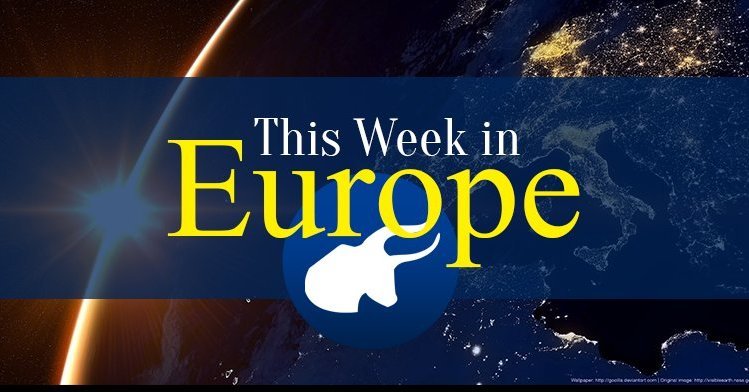EU’s Jerusalem statement blocked
Last Friday, the Czech Republic, Hungary and Romania vetoed an EU statement regarding the opening of the U.S. embassy in Jerusalem, which happened this Monday. Citing its long-standing relationship with Israel and the U.S., the Czech Republic further protested against the planned EU statement prepared by the other 25 EU countries. Moreover, on Monday Austria broke the ranks and sent its envoy to the embassy opening, while the remaining 24 member states boycotted it.
“Move your embassies to Jerusalem because it’s the right thing to do,” Israeli prime minister Benjamin Netanyahu told foreign dignitaries at an event in the city on Sunday, while John Bolton, Trump’s national security advisor, stated the same. However, a report by the EU ambassadors showed that Israel’s settlement program continues even now, with 3,000 housing units added to East Jerusalem last year, adding to the 215,000 Israeli settles who currently live in the occupied territories.
Soros’ Open Society Foundation leaves Hungary
This week, the Open Society Foundations in Hungary, backed by American financier George Soros, decided to close its offices and move the entire staff to Berlin. The reason cites was the increasingly repressive political and legal environment created by the Orban administration. Next month, Budapest plans to pass laws that would make it impossible for many civil society foundations to continue working in Hungary. The fight against Soros was one of the main topics used by PM Viktor Orban to win the elections early last month, plastering billboards featuring the billionaire across the country and portraying him as in control of the European Commission, the Parliament and the NGOs.
French Ex-Minister guilty of tax fraud
On Tuesday, the Paris Court of Appeals found former French Budget Minister Jerome Cahuzac guilty on charges of tax fraud and money laundering. Serving under former President Hollande, Cahuzac was sentenced to four years in prison - two of them suspended - and a fine of €300,000. He will also be barred from holding public office for 5 years. The crimes of the former minister were first revealed in 2012 by the French news site Mediapart, which discovered that he had been keeping money - €3.5 million - in a Swiss bank account for almost 20 years.
European trade unions tackle climate change
On Tuesday, the European Trade Union Confederation (ETUC) unveiled its plan to involve trade unions across the continent in the process of tackling climate change. The ETUC presented a guide for trade union leaders and EU officials that would ease the transition towards a low carbon economy. The guide harmonizes the protection of the environment with workers’ rights. On the European level, there is so far no unified approach of the trade unions to the problems of the environment. However, some countries - France, Germany, the Netherlands - have in place mechanisms through which unions can collaborate with NGOs and politicians on these very topics.
Bulgaria pursues nuclear energy
Last Saturday, Bulgarian PM Boyko Borissov announced that the construction of his country’s second nuclear power plant will resume after 6 years of pause, this time with Chinese financial backing. In 2007, at the moment of its accession to the EU, Bulgaria closed down 4 Soviet-era reactors due to safety reasons, keeping their nuclear power plant on just two active reactors. As the people, the government and even the opposition support the project, it will likely continue without any issues. The outside assistance in the construction of the nuclear power plant will be provided by the China National Nuclear Corporation, but also from the French company Framatom and the Russian Atomstroyexport.
8 EU states miss data protection deadline
Next week, the EU plans to fully enforce its upgraded data protection law, but eight states will not be ready, seeing as they failed to sort out their domestic legal acts and will therefore lack the resources to impose sanctions. Belgium, Bulgaria, Cyprus, the Czech Republic, Greece, Hungary, Lithuania and Slovenia will thus miss the May 25th deadline set by the European Commission. EU Commissioner for Justice Vera Jourova held firm, stating that countries had enough time to prepare for the new law, known as the general data protection regulation (GDPR). Essentially, the new regulations give people living in the EU control over how companies exploit their personal data anywhere in the world. While only Austria, Germany, France, Croatia, the Netherlands, Sweden and Slovakia are truly ready for the GDPR, the rest of the member-states are expected to harmonize domestic regulations to it soon enough.
M5S and the League reach coalition agreement
On Friday, Italy’s 5 Star Movement and the Northern League unveiled their final coalition agreement. Receiving the highest number of votes in the country’s last elections, the two parties outlined the main aspects of their future government. On an upward trend in the polls since the March elections, the Northern League has clearly impacted the governing program more than the M5S, which stagnated in the polls. While plans to leave the eurozone disappeared, the new program calls for a reevaluation of the EU budget and what they call European economic governance, which both parties see as divorced from the true needs of the people.
To meet these needs, the new coalition wants to create a public investment bank and to convince the EU to give people greater protection from economic troubles. Moreover, the “universal citizens’ income” promised by the M5S is also included, but in an altered form - giving people aid for a maximum of 2 years, while they look for a job. On the other hand, the 15% flat tax promoted by the right-wing League has become a dual rate of 15% and 20% based on income. On the foreign affairs stage, M5S and the League also want to lift the sanctions on Russia immediately.
EU Ombudsman: EU Council too secretive
This week, EU Ombudsman Emily O’Reilly presented a special report on the lack of transparency and accountability at the Council of the EU. The report states that the institution’s secretive ways of working contributes to the culture of blaming Brussels for the Continent’s ills. Gathering information for more than a year, the report took into account questions to the Council, public consultation, the minutes taken - or the lack thereof - and the inspection of legislative projects. O’Reilly said that she issued recommendations to the Council but that it failed to respond within the legal 3-month deadline, so she passed the report to the European Parliament. The Ombudsman stated that her effort comes to meet the criticism of those who declare that the EU suffers from a democratic deficit.


Follow the comments: |
|
